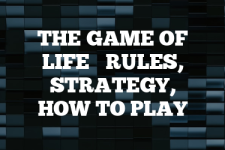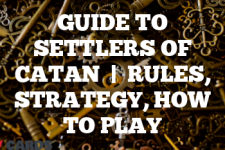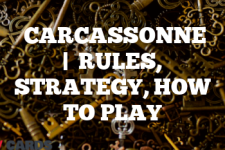Concept: Mastering the Art of Visual Communication Rules, Winning & Instructions
Introduction
Concept is a unique and engaging board game that challenges players to communicate complex ideas using only a board filled with universal icons. The game requires a blend of creativity, strategy, and a keen understanding of visual language. The equipment needed to play Concept includes a game board, tokens, cubes, and cards that contain the concepts to be guessed.
The game was designed by Gaëtan Beaujannot and Alain Rivollet and published by Repos Production. It was first introduced in 2013 and garnered immediate attention and popularity. It is a guessing game where players use universal iconography to communicate complex concepts to their teammates. The game is often compared to charades, with the main difference being that players use visual clues instead of physical gestures.
The idea of Concept is believed to have been inspired by the universal nature of symbols and the human ability to decipher meanings from abstract representations. The creators, Beaujannot and Rivollet, wanted to design a game that transcends language barriers and encourages innovative thinking. They were interested in the idea of communication through symbols, which led them to create a game where players have to guess a concept based on visual hints.
The game’s design is simple and straightforward, with a board featuring a variety of universal icons and a set of cubes and tokens for players to indicate the main concept and sub-concepts. Despite its simplicity, the game offers endless possibilities for fun and challenge, as the concepts to guess can range from easy to incredibly complex.
Concept received a nomination for the prestigious Spiel des Jahres (Game of the Year) award in 2014, cementing its place in the world of board games. The game has been translated into multiple languages and is sold worldwide, reflecting its universal appeal.
The success of Concept lies in its unique approach to the guessing game genre. By using visual symbols instead of words or gestures, it challenges players to think outside the box and interpret meanings in a different way. It is a game that tests not only the players’ knowledge and guessing abilities, but also their creativity and problem-solving skills.
The game continues to be popular and has sparked a number of expansions and versions, including a kids’ version. As of today, Concept remains a favorite among board game enthusiasts for its originality, inclusivity, and a lot of replayability.
Rules for playing Concept
The official rules for playing Concept are straightforward. The game begins with one player, known as the ‘conceptor’, drawing a card and choosing a Concept to convey. The conceptor then places tokens and cubes on the game board’s icons to represent the chosen Concept. The other players must guess the Concept based on these visual clues. The player who guesses correctly earns points. The game continues until all the cards have been used or a predetermined point limit is reached.
While the official rules are simple, many players enjoy adding ‘house rules’ to increase the challenge or add a personal touch to the game. For example, some players may choose to limit the number of guesses each player can make, or introduce a time limit for each round.
How to Win at Concept
Winning at Concept requires a blend of strategic thinking, creativity, and a keen understanding of visual language. Here are some strategies to help you win at Concept:
- Think Outside the Box: The icons on the Concept board are designed to be universal and can represent a wide range of ideas. Don’t be afraid to use them in unconventional ways to convey your Concept.
- Use Multiple Icons: Sometimes, a single icon isn’t enough to convey a complex Concept. Don’t hesitate to use multiple icons to create a more detailed picture of your Concept.
- Pay Attention to Your Opponents: Keep an eye on the guesses your opponents are making. Their guesses can give you insight into how they’re interpreting your clues, allowing you to adjust your strategy accordingly.
Best Strategies for playing Concept game
While there’s no surefire way to win at Concept, there are several strategies that can increase your chances of success:
- Start Simple: If you’re new to Concept, start with simple concepts that can be easily represented by one or two icons. As you become more comfortable with the game, you can start tackling more complex concepts.
- Use Sub-Concepts: If your main Concept is too complex to convey with a single set of icons, consider breaking it down into smaller sub-concepts. This can make your clues easier to understand and increase your chances of success.
- Practice: Like any game, the more you play Concept, the better you’ll get. Practice using the icons in different ways and experiment with different strategies to find what works best for you.
Scenarios for Concept
Playing Concept can lead to a wide range of scenarios, both good and bad. Here are some common scenarios you might encounter and how to turn them to your advantage:
- Scenario: Your opponents are struggling to guess your Concept. Solution: Try a different approach. If your current clues aren’t working, don’t be afraid to start over with a new set of icons.
- Scenario: You’re struggling to convey a complex Concept. Solution: Break it down into smaller sub-concepts. This can make your clues easier to understand and increase your chances of success.
- Scenario: Your opponents are consistently guessing your concepts correctly. Solution: Mix things up. Try using the icons in unconventional ways to keep your opponents guessing.
Frequently Asked Questions about playing Concept game
Q: Can I use verbal clues in Concept? A: No, Concept is a purely visual game. All clues must be conveyed using the icons on the game board.
Q: How many players can play Concept? A: Concept can be played with 4 to 12 players.
Q: How long does a game of Concept typically last? A: A game of Concept typically lasts between 30 and 40 minutes.
Q: Can I play Concept with children? A: Yes, Concept is suitable for players aged 10 and up.
Q: Can I create my own concepts for Concept? A: Yes, creating your own concepts can add a fun and personal touch to the game.
External Links
For more information about Concept, visit the official game website here.

A digital native around since the early days of online gaming communities around 2001. An early contributor to the cult gaming site ClanTemplates, Adam has spent years giving free gaming resources to the community. With BoardCards, Adam is most experienced and commonly writing the articles on Strategy multi-player games like Settlers of Catan and Avalon. His first introduction to board games was via Mancala, an Egyptian-origin stone game and one of the oldest known games still played worldwide. Contact me via email



